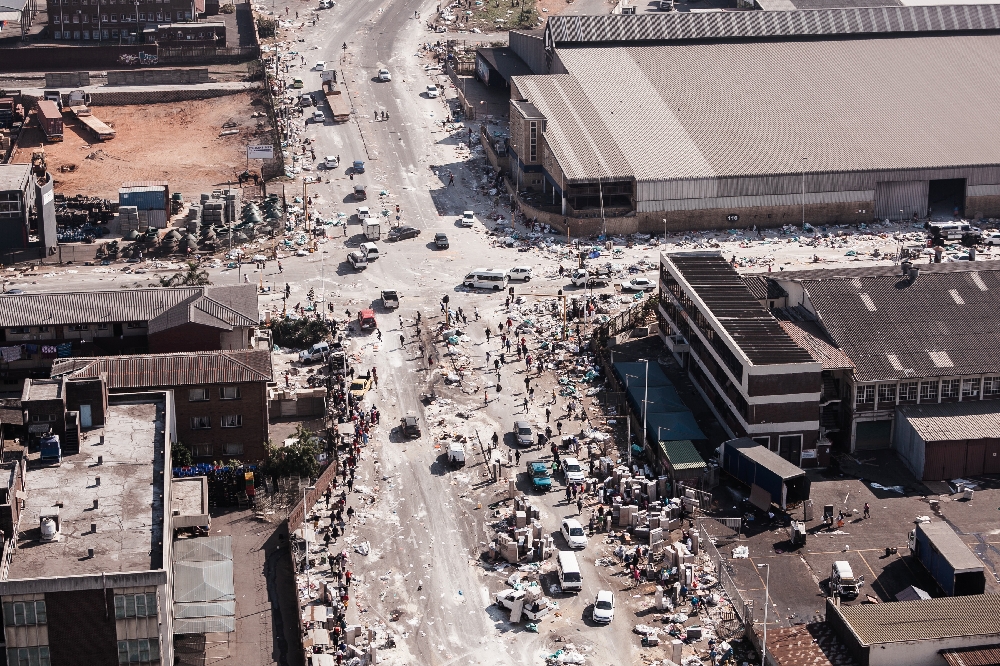Johannesburg – South African President Cyril Ramaphosa on Friday said what many of his countrymen suspected: the violence and looting gripping the country had been orchestrated.
If so, say analysts, it points to a massive failure by the police, military and intelligence agencies.
Their combined might failed to spot the looming risk – or prevent the unrest from snowballing into the biggest crisis in post-apartheid South Africa’s history.
More than 200 people have been killed in the week-long rampage that struck KwaZulu-Natal province and Johannesburg, and possibly thousands of businesses have been ransacked.
Trucks transporting goods from the Port of Durban were torched, partially closing the artery that connects the harbour to destinations across the continent’s most industrialised nation, southern Africa and beyond.
ALSO READ | WATCH | Cyril Ramaphosa joins post-riot clean-up campaign on #MandelaDay
The breakdown of law and order came after the jailing on July 8 of former president Jacob Zuma, an anti-apartheid icon and champion of the poor to his followers.
Experts say police criminal intelligence, despite an annual budget of $290 million, failed to spot the signs of brewing chaos.
“They were very slow to respond, they were caught off guard,” Gareth Newham of the Institute for Security Studies said.
“I assume that they didn’t have the intelligence… and if they did have details, the systems for ensuring that police response was guided by intelligence weren’t working properly.”
As for military support, it took five days from the start of the unrest for the army to announce it would raise the number of soldiers deployed to 25 000.
ALSO READ | South Africa shuts beaches, probes sea pollution after riots
It had initially announced a deployment just 2 500 troops – a level that had been widely derided as insufficient.
Ramaphosa said the disorder would spark a reassessment of the country’s preparedness but praised the security forces for doing “the best they could”.
“We regret the situation that has resulted in this. This is not what we want to see in our country,” he said in Durban on Friday.
“Obviously we are having to go re-examine everything that we do in defence of our people, in defending the assets of the country.”
Former security minister Sydney Mufamadi said there were “early warning signals… with the build-up of tension in Nkandla,” Zuma’s rural home in KwaZulu-Natal.
ALSO READ | PICS | South Africans clean up after shocking violent protests
“There was irresponsible talk about a national shutdown. There was ample time for the police and the rest of the security establishment to move ahead of the curve,” he said.
Zuma has a loyal following among grassroots members of the ruling African National Congress (ANC), who portray him as a defender of the downtrodden.
Hundreds of his supporters, some of them armed, gathered outside his homestead as his deadline for incarceration loomed, and he harangued them with a fiery speech.
Defence Minister Nosiviwe Mapisa-Nqakula told parliament Wednesday that intelligence of planned attacks on shopping malls came “too late”.
ALSO READ | SA disorder culprits sought ‘popular insurrection’, says Ramaphosa
“We did not have that information… and from what I am getting, even the police did not have that information,” she said.
Mufamadi said the extent of the bloodshed and economic loss could have been limited “if both the strategic and operational leadership (had) showed better foresight”.
Police failure to embed in communities risked compromising the quality of the intelligence it gathered, Mufamadi added.
The main opposition Democratic Alliance party said Friday it planned to make criminal complaints against a number of individuals it accused of instigating the violence.
It claimed they have links to the ANC, accusing them of treason and terrorism.
ALSO READ | ‘No receipt, hard luck’: SA police seize suspected loot
The government said on Thursday that one of the suspected instigators had been arrested and 11 were under surveillance.
The devastation to economic infrastructure and South Africa’s reputation for business has been huge.
The total bill could reach 50 billion rand ($3.4 billion), according to consultancy Intellidex.
Spooked investors have ditched the South African rand, which has fallen to a six-month low against the US dollar.
The police force has been crippled by a leadership crisis as murders and armed robberies have increased since 2012 and detections have dwindled, according to Newham.
“(Ramaphosa) has to make sure the police work more effectively given the amount of money he spends on them… if he wants to achieve his economic agenda,” he said.
Follow African Insider on Facebook, Twitter and Instagram
Source: AFP
Picture: AFP
For more African news, visit Africaninsider.com


